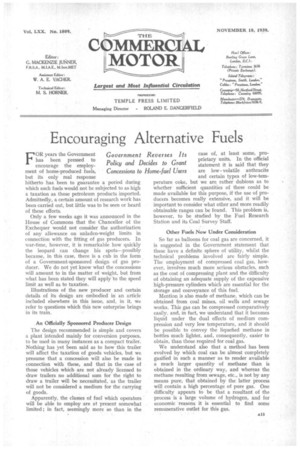Encouraging Alternative Fuels
Page 17

If you've noticed an error in this article please click here to report it so we can fix it.
FOR years the Government has been pressed to encourage the employment of home-produced fuels, but its only real response hitherto has been to guarantee a period during which such fuels would not be subjected to as high a taxation as those petroleum products imported. Admittedly, a certain amount of research work has been carried out, but little was to be seen or heard of these efforts.
Only a few weeks ago it was announced in the House of Commons that the Chancellor of the Exchequer would not consider the authorization of any allowance on unladen-weight limits in connection with the fitting of gas producers. In war-time, however, it is remarkable how quickly the leopard can change his spots—possibly because, in this case, there is a cub in the form of a Government-sponsored design of gas producer. We do not yet know what the concessions will amount to in the matter of weight, but from what has been stated they will apply 'to the speed limit as well as to taxation.
Illustrations of the new producer and certain details of its design are embodied in an article included elsewhere in this issue, and, in it, we refer to questions which this new enterprise brings in its train.
An Officially Sponsored Producer Design The design recommended is simple and covers a plant intended mainly for conversion purposes, to be used in many instances as a compact trailer. Nothing has yet been said as to how this trailer will affect the taxation of goods vehicles, but we presume that a concession will also be made in connection with these, and that in the case of those vehicles which are not already licensed to draw trailers no additional sum for the right to draw a trailer will be necessitated, as the trailer will not be considered a medium for the carrying of goods.
Apparently, the classes of fuel which operators will be able to employ are at present somewhat limited; in fact, seemingly more so than in the case of, at least some, proprietary units. In the official statement it is said that they are low volatile anthracite and certain types of low-temperature coke, but we are rather dubious as to whether sufficient quantities of these could be made available for this purpose, if the use of producers becomes really extensive, and it will be important to consider what other and more readily obtainable ranges can be found. This problem is, however, to be studied by the Fuel Research Station and its Coal Survey Staff, Other Fuels Now Under Consideration So far as balloons for coal gas are concerned, it is suggested in the Government statement that these have a definite sphere of utility, whilst the technical problems involved are fairly simple. The employment of compressed coal gas, however, involves much more serious obstacles, such as the cost of compressing plant and the difficulty of obtaining an adequate supply of the expensive high-pressure cylinders which are essential for the storage and conveyance of this fuel.
Mention is also made of methane, which can be obtained from coal mines, oil wells and sewage works. This gas can be compressed comparatively easily, and, in fact, we understand that it becomes liquid under the dual effects of medium compression and very low temperature, and it should be possible to convey the liquefied methane in bottles much lighter, and, consequently, easier to obtain, than those required for coal gas.
We understand also that a method has been evolved by which coal can be almost completely gasified in such a manner as to render available a much larger quantity of methane than is obtained in the ordinary way, and whereas the methane resulting from sewage, etc., is not by any means pure, that obtained by the latter process will contain a high percentage of pure gas. One difficulty appears to be that a resultant of the process is a large volume of hydrogen, and for economic reasons it is essential to find some remunerative outlet for this gas.




























































